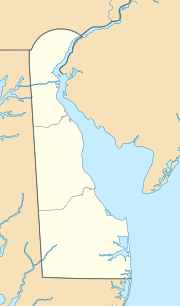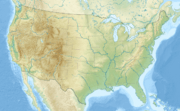Goslee Creek (Love Creek tributary) facts for kids
Quick facts for kids Goslee Creek |
|
|---|---|
| Other name(s) | Tributary to Love Creek |
| Country | United States |
| State | Delaware |
| County | Sussex |
| Physical characteristics | |
| Main source | Black Hog Gut divide about 0.25 miles north of Jimtown, Delaware 14 ft (4.3 m) 38°44′11″N 075°10′57″W / 38.73639°N 75.18250°W |
| River mouth | Love Creek Goslee Millpond 3 ft (0.91 m) 38°43′26″N 075°11′16″W / 38.72389°N 75.18778°W |
| Length | 1.38 mi (2.22 km) |
| Basin features | |
| Progression | south-southwest |
| River system | Rehoboth Bay |
| Basin size | 3.65 square miles (9.5 km2) |
| Tributaries |
|
| Bridges | Jimtown Road |
Goslee Creek is a small stream in Sussex County, Delaware. It is about 1.38 mi (2.22 km) long. This creek flows into Love Creek, which is a larger stream that eventually reaches Rehoboth Bay.
Contents
Other Names for Goslee Creek
Sometimes, creeks and rivers have different names over time.
Historically Known As
- Gosling Creek
Where Goslee Creek Flows
Every stream has a starting point and an ending point.
The Beginning of the Creek
Goslee Creek starts in Sussex County, Delaware. Its source is in an area called the Black Hog Gut divide. This spot is about 0.25 miles north of a small place called Jimtown.
The Creek's Journey
From where it begins, Goslee Creek flows mainly towards the south. It travels a short distance until it meets Love Creek. The two creeks join together inside a pond known as Goslee Millpond.
The Goslee Creek Watershed
A watershed is an area of land where all the water drains into a specific river or stream.
Understanding the Watershed Area
The Goslee Creek watershed covers about 3.65 square miles (9.5 km2) of land. This means all the rain and water that falls in this area will eventually flow into Goslee Creek.
Environment Around the Creek
The area around Goslee Creek gets a good amount of rain, about 45.4 inches each year. About 10.3% of the land in this watershed is covered by forests. This forested land helps keep the water clean and provides homes for wildlife.
 | Janet Taylor Pickett |
 | Synthia Saint James |
 | Howardena Pindell |
 | Faith Ringgold |



